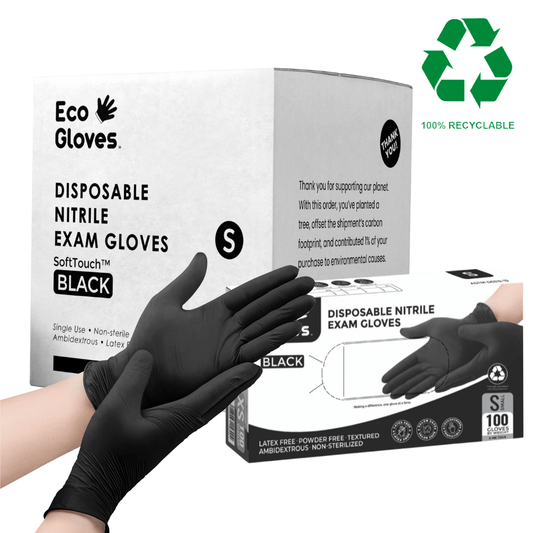Understanding ASTM D6400: What It Means for Compostable Gloves
Eco GlovesIn an era where sustainability claims are everywhere, it’s getting harder for both consumers and businesses to separate meaningful action from greenwashing. With disposable products—especially gloves—used by millions daily across food service, healthcare, hospitality, and personal use, the environmental stakes are high. Many products are labeled as “eco-friendly,” “biodegradable,” or “green,” but without standardized testing and third-party certification, these claims often fall short of true environmental benefit.
One certification stands out above the rest in the world of compostable plastics: ASTM D6400. Often referred to as the gold standard for compostability, this certification ensures that a product will completely break down under specific conditions—without leaving toxic residue—within a commercial composting facility. For businesses looking to reduce waste responsibly and consumers seeking truly sustainable options, understanding ASTM D6400 is key.
Topics Covered
- What Is ASTM D6400?
- Why ASTM D6400 Certification Matters for Compostable Gloves
- How Compostable Gloves Are Tested and Certified
-
Compostable Gloves vs. Biodegradable or Recyclable Gloves
- Do ASTM D6400 Compostable Gloves Break Down at Home?
- What to Look for When Buying Compostable Gloves
- Why ASTM D6400 Is the Benchmark for Going Green
- Key Takeaways: Understanding ASTM D6400 for Compostable Gloves
- Frequently Asked Questions About ASTM D6400 Compostable Gloves
What Is ASTM D6400?
ASTM D6400 is a specification developed by the American Society for Testing and Materials (ASTM International), an organization that sets globally recognized technical standards across a wide range of industries. Specifically, ASTM D6400 is the standard specification for plastics and products designed to compost in municipal or industrial aerobic composting facilities.
In other words, ASTM D6400 certified products like compostable gloves are engineered to return to nature safely, provided they are sent to the right composting facility.
Why ASTM D6400 Certification Matters for Compostable Gloves
The demand for disposable gloves has skyrocketed, with the global disposable glove market projected to reach $20.71 billion by 2030, largely driven by food safety, medical, and hygiene requirements. However, the traditional latex, vinyl, and nitrile gloves used in these settings are often made from synthetic materials that take decades to break down and can leach toxic chemicals into soil and waterways.
This is where ASTM D6400-certified compostable gloves provide a responsible alternative. Here’s why certification matters:
Avoids Greenwashing
The term “biodegradable” is often misused. Without certification, it might simply mean a product breaks down into microplastics over the years. ASTM D6400 ensures a full breakdown within months in industrial composters.
Ensures Soil Safety
Certified gloves are tested for toxicity and heavy metals, ensuring they won’t harm the environment when they decompose.
Boosts Trust
For businesses in food service, hospitality, and healthcare, using certified compostable gloves supports brand trust and compliance with environmentally conscious procurement standards.
Aligns with ESG Goals
Organizations increasingly aim to reduce landfill waste. Certified compostable products allow measurable impact reporting aligned with environmental, social, and governance (ESG) criteria.
How Compostable Gloves Are Tested and Certified
To obtain ASTM D6400 certification, compostable gloves must undergo a rigorous, multi-phase testing process, typically conducted by accredited third-party laboratories and certifying organizations such as the Biodegradable Products Institute (BPI).
Here’s a breakdown of the testing process:
-
Disintegration Testing: The gloves are placed in a controlled composting environment (58°C ± 2°C) for 90 days. They must physically break apart and integrate into compost without visible remnants.
-
Biodegradation Testing: The gloves are tested in composting conditions to confirm that they biodegrade into carbon dioxide (CO₂). The rate must match or exceed that of known compostables like cellulose.
-
Ecotoxicity and Heavy Metal Analysis: After composting, the finished material is tested by growing plants in it to ensure no toxicity. Additionally, gloves must pass strict thresholds for lead, cadmium, chromium, copper, and other heavy metals.
- Certification and Labeling: Products passing the tests receive certification labels such as the BPI Compostable logo, confirming compliance with ASTM D6400.
This testing ensures compostable gloves will not contaminate the compost stream, a growing concern in large-scale municipal composting operations.
Compostable Gloves vs. Biodegradable or Recyclable Gloves
It's crucial to understand the difference between the most common eco-related glove terms, , as they often get used interchangeably—but they’re not the same. Each term represents a different environmental impact and disposal method, and knowing these distinctions can help you make more informed purchasing decisions.
Do ASTM D6400 Compostable Gloves Break Down at Home?
One of the most common misunderstandings about compostable gloves is where they actually break down. Just because a glove is labeled as "compostable" doesn’t mean it will decompose in your backyard compost bin. The ASTM D6400 certification specifically applies to industrial or commercial composting environments—not home compost settings.
ASTM D6400 sets standards that require compostable products to completely disintegrate and biodegrade within a set timeframe under tightly controlled conditions, including:
-
High Heat: Temperatures in commercial composting facilities typically range between 130–160°F (55–70°C), which significantly accelerates the breakdown process.
-
High Humidity: Moisture levels are carefully regulated to support microbial activity essential for decomposition.
- Aeration and Microbial Activity: Industrial composting systems are constantly turned or aerated to provide oxygen and promote the growth of bacteria and fungi that help break down materials quickly and efficiently.
These conditions are very difficult—if not impossible—to replicate in a standard backyard compost setup. As a result, ASTM D6400 gloves may not fully break down at home, or they may take much longer to break down and potentially leave behind residue.
For that, look for products certified under TÜV Austria’s OK Compost HOME or the EN 13432 standard, which define compostability under lower-temperature, less-controlled conditions. Most gloves, due to their structure and durability, require industrial facilities for full breakdown.
Consumers and businesses should check with local composting programs to see if they accept certified compostable gloves. To locate composting options near you, visit Find a Composter, a resource provided by the US Composting Council.
What to Look for When Buying Compostable Gloves
When choosing gloves that support your sustainability goals, look beyond vague labels. Here’s what to prioritize:
ASTM D6400 or BPI Certified Label: This proves the glove meets strict standards for compostability in industrial settings.
Manufacturer Transparency: Look for suppliers that clearly list certifications and testing bodies.
Avoid Unverified Claims: Words like “eco-friendly” or “biodegradable” without certification can be meaningless.
Performance Suitability: Ensure gloves are also durable, safe, and comfortable for the intended use case (food handling, cleaning, etc.).
Trusted Suppliers: Work with vendors who are mission-driven and knowledgeable about sustainability.
Why ASTM D6400 Is the Benchmark for Going Green
In a world full of environmental claims, ASTM D6400 certification provides clarity, credibility, and confidence. For eco-conscious individuals and businesses, choosing compostable gloves that meet this rigorous standard ensures that sustainability goals aren’t just talked about—they’re achieved.
Whether you're a food prep professional, hospitality provider, or simply someone committed to reducing your environmental impact, switching to certified compostable gloves is a simple but powerful step toward a more sustainable future.
At Eco Gloves, we’re proud to offer compostable gloves that meet ASTM D6400 standards, ensuring you get a product that performs responsibly, both during and after use. We also go beyond just gloves, with initiatives like plastic removal and carbon offsetting, so you can feel good about every purchase. Explore our compostable glove collection today and take your sustainability efforts one step further.
Key Takeaways: Understanding ASTM D6400 for Compostable Gloves
-
Gold Standard for Compostability: ASTM D6400 certification ensures products fully break down in industrial composting facilities without leaving toxic residue.
-
Proof Against Greenwashing: Certification verifies true compostability, avoiding vague or misleading “eco-friendly” claims.
-
Environmental & Soil Safety: Certified gloves are tested for heavy metals and ecotoxicity, ensuring compost remains safe for plants and ecosystems.
-
Not for Home Composting: ASTM D6400 applies to high-heat, controlled industrial compost settings, not backyard compost piles.
-
Supports ESG & Sustainability Goals: Using certified compostable gloves reduces landfill waste and supports measurable environmental commitments.
-
Trusted Certification Labels: Look for ASTM D6400 or BPI marks to confirm compliance and authenticity.
👉 Choosing ASTM D6400-certified compostable gloves helps businesses and individuals meet sustainability goals with proven environmental performance and no compromise on function.
Frequently Asked Questions About ASTM D6400 Compostable Gloves
-
What is ASTM D6400 certification?
It’s a standard from ASTM International that ensures products fully biodegrade in industrial composting without leaving harmful residues.
-
Are ASTM D6400 gloves compostable at home?
No. They require the high heat and controlled conditions of industrial composting facilities to break down effectively.
-
How fast do compostable gloves break down?
In industrial composting, they typically disintegrate within 90 days and fully biodegrade within 180 days.
-
Why choose compostable gloves over biodegradable gloves?
Biodegradable gloves may leave microplastics; compostable gloves fully degrade into non-toxic materials in a set timeframe.
-
How can I tell if gloves are truly compostable?
Check for credible certification labels like ASTM D6400 or BPI on the packaging.
-
Where can I compost these gloves?
Use municipal or commercial composting facilities that accept certified compostable products—check local programs for availability.
Related Reading
- The Ultimate Buyer's Guide to Eco-Friendly Gloves: Selecting the Best Sustainable Disposable Gloves in 2024
- What Makes Compostable Gloves Better for the Environment
- How to Choose the Best Disposable Gloves for Cleaning



















